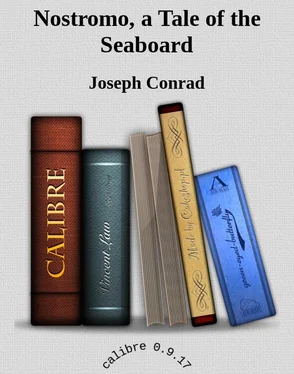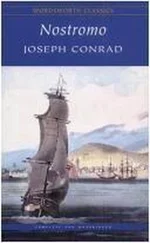Joseph Conrad - Nostromo, a Tale of the Seaboard
Здесь есть возможность читать онлайн «Joseph Conrad - Nostromo, a Tale of the Seaboard» весь текст электронной книги совершенно бесплатно (целиком полную версию без сокращений). В некоторых случаях можно слушать аудио, скачать через торрент в формате fb2 и присутствует краткое содержание. Жанр: Старинная литература, на английском языке. Описание произведения, (предисловие) а так же отзывы посетителей доступны на портале библиотеки ЛибКат.
- Название:Nostromo, a Tale of the Seaboard
- Автор:
- Жанр:
- Год:неизвестен
- ISBN:нет данных
- Рейтинг книги:4 / 5. Голосов: 1
-
Избранное:Добавить в избранное
- Отзывы:
-
Ваша оценка:
- 80
- 1
- 2
- 3
- 4
- 5
Nostromo, a Tale of the Seaboard: краткое содержание, описание и аннотация
Предлагаем к чтению аннотацию, описание, краткое содержание или предисловие (зависит от того, что написал сам автор книги «Nostromo, a Tale of the Seaboard»). Если вы не нашли необходимую информацию о книге — напишите в комментариях, мы постараемся отыскать её.
Nostromo, a Tale of the Seaboard — читать онлайн бесплатно полную книгу (весь текст) целиком
Ниже представлен текст книги, разбитый по страницам. Система сохранения места последней прочитанной страницы, позволяет с удобством читать онлайн бесплатно книгу «Nostromo, a Tale of the Seaboard», без необходимости каждый раз заново искать на чём Вы остановились. Поставьте закладку, и сможете в любой момент перейти на страницу, на которой закончили чтение.
Интервал:
Закладка:
It had grown dark. From the living-room of the light-keeper's cottage, where Giorgio, one of the Immortal Thousand, was bending his leonine and heroic head over a charcoal fire, there came the sound of sizzling and the aroma of an artistic frittura.
In the obscure disarray of that thing, happening like a cataclysm, it was in her feminine head that some gleam of reason survived. He was lost to the world in their embraced stillness. But she said, whispering into his ear—
"God of mercy! What will become of me—here—now—between this sky and this water I hate? Linda, Linda—I see her!" . . . She tried to get out of his arms, suddenly relaxed at the sound of that name. But there was no one approaching their black shapes, enlaced and struggling on the white background of the wall. "Linda! Poor Linda! I tremble! I shall die of fear before my poor sister Linda, betrothed to-day to Giovanni—my lover! Giovanni, you must have been mad! I cannot understand you! You are not like other men! I will not give you up—never—only to God himself! But why have you done this blind, mad, cruel, frightful thing?"
Released, she hung her head, let fall her hands. The altar-cloth, as if tossed by a great wind, lay far away from them, gleaming white on the black ground.
"From fear of losing my hope of you," said Nostromo.
"You knew that you had my soul! You know everything! It was made for you! But what could stand between you and me? What? Tell me!" she repeated, without impatience, in superb assurance.
"Your dead mother," he said, very low.
"Ah! . . . Poor mother! She has always . . . She is a saint in heaven now, and I cannot give you up to her. No, Giovanni. Only to God alone. You were mad—but it is done. Oh! what have you done? Giovanni, my beloved, my life, my master, do not leave me here in this grave of clouds. You cannot leave me now. You must take me away—at once—this instant—in the little boat. Giovanni, carry me off to-night, from my fear of Linda's eyes, before I have to look at her again."
She nestled close to him. The slave of the San Tome silver felt the weight as of chains upon his limbs, a pressure as of a cold hand upon his lips. He struggled against the spell.
"I cannot," he said. "Not yet. There is something that stands between us two and the freedom of the world."
She pressed her form closer to his side with a subtle and naive instinct of seduction.
"You rave, Giovanni—my lover!" she whispered, engagingly. "What can there be? Carry me off—in thy very hands—to Dona Emilia—away from here. I am not very heavy."
It seemed as though she expected him to lift her up at once in his two palms. She had lost the notion of all impossibility. Anything could happen on this night of wonder. As he made no movement, she almost cried aloud—
"I tell you I am afraid of Linda!" And still he did not move. She became quiet and wily. "What can there be?" she asked, coaxingly.
He felt her warm, breathing, alive, quivering in the hollow of his arm. In the exulting consciousness of his strength, and the triumphant excitement of his mind, he struck out for his freedom.
"A treasure," he said. All was still. She did not understand. "A treasure. A treasure of silver to buy a gold crown for thy brow."
"A treasure?" she repeated in a faint voice, as if from the depths of a dream. "What is it you say?"
She disengaged herself gently. He got up and looked down at her, aware of her face, of her hair, her lips, the dimples on her cheeks—seeing the fascination of her person in the night of the gulf as if in the blaze of noonday. Her nonchalant and seductive voice trembled with the excitement of admiring awe and ungovernable curiosity.
"A treasure of silver!" she stammered out. Then pressed on faster: "What? Where? How did you get it, Giovanni?"
He wrestled with the spell of captivity. It was as if striking a heroic blow that he burst out—
"Like a thief!"
The densest blackness of the Placid Gulf seemed to fall upon his head. He could not see her now. She had vanished into a long, obscure abysmal silence, whence her voice came back to him after a time with a faint glimmer, which was her face.
"I love you! I love you!"
These words gave him an unwonted sense of freedom; they cast a spell stronger than the accursed spell of the treasure; they changed his weary subjection to that dead thing into an exulting conviction of his power. He would cherish her, he said, in a splendour as great as Dona Emilia's. The rich lived on wealth stolen from the people, but he had taken from the rich nothing—nothing that was not lost to them already by their folly and their betrayal. For he had been betrayed—he said—deceived, tempted. She believed him. . . . He had kept the treasure for purposes of revenge; but now he cared nothing for it. He cared only for her. He would put her beauty in a palace on a hill crowned with olive trees—a white palace above a blue sea. He would keep her there like a jewel in a casket. He would get land for her—her own land fertile with vines and corn—to set her little feet upon. He kissed them. . . . He had already paid for it all with the soul of a woman and the life of a man. . . . The Capataz de Cargadores tasted the supreme intoxication of his generosity. He flung the mastered treasure superbly at her feet in the impenetrable darkness of the gulf, in the darkness defying—as men said—the knowledge of God and the wit of the devil. But she must let him grow rich first—he warned her.
She listened as if in a trance. Her fingers stirred in his hair. He got up from his knees reeling, weak, empty, as though he had flung his soul away.
"Make haste, then," she said. "Make haste, Giovanni, my lover, my master, for I will give thee up to no one but God. And I am afraid of Linda."
He guessed at her shudder, and swore to do his best. He trusted the courage of her love. She promised to be brave in order to be loved always—far away in a white palace upon a hill above a blue sea. Then with a timid, tentative eagerness she murmured—
"Where is it? Where? Tell me that, Giovanni."
He opened his mouth and remained silent—thunderstruck.
"Not that! Not that!" he gasped out, appalled at the spell of secrecy that had kept him dumb before so many people falling upon his lips again with unimpaired force. Not even to her. Not even to her. It was too dangerous. "I forbid thee to ask," he cried at her, deadening cautiously the anger of his voice.
He had not regained his freedom. The spectre of the unlawful treasure arose, standing by her side like a figure of silver, pitiless and secret, with a finger on its pale lips. His soul died within him at the vision of himself creeping in presently along the ravine, with the smell of earth, of damp foliage in his nostrils—creeping in, determined in a purpose that numbed his breast, and creeping out again loaded with silver, with his ears alert to every sound. It must be done on this very night—that work of a craven slave!
He stooped low, pressed the hem of her skirt to his lips, with a muttered command—
"Tell him I would not stay," and was gone suddenly from her, silent, without as much as a footfall in the dark night.
She sat still, her head resting indolently against the wall, and her little feet in white stockings and black slippers crossed over each other. Old Giorgio, coming out, did not seem to be surprised at the intelligence as much as she had vaguely feared. For she was full of inexplicable fear now—fear of everything and everybody except of her Giovanni and his treasure. But that was incredible.
The heroic Garibaldino accepted Nostromo's abrupt departure with a sagacious indulgence. He remembered his own feelings, and exhibited a masculine penetration of the true state of the case.
"Va bene. Let him go. Ha! ha! No matter how fair the woman, it galls a little. Liberty, liberty. There's more than one kind! He has said the great word, and son Gian' Battista is not tame." He seemed to be instructing the motionless and scared Giselle. . . . "A man should not be tame," he added, dogmatically out of the doorway. Her stillness and silence seemed to displease him. "Do not give way to the enviousness of your sister's lot," he admonished her, very grave, in his deep voice.
Читать дальшеИнтервал:
Закладка:
Похожие книги на «Nostromo, a Tale of the Seaboard»
Представляем Вашему вниманию похожие книги на «Nostromo, a Tale of the Seaboard» списком для выбора. Мы отобрали схожую по названию и смыслу литературу в надежде предоставить читателям больше вариантов отыскать новые, интересные, ещё непрочитанные произведения.
Обсуждение, отзывы о книге «Nostromo, a Tale of the Seaboard» и просто собственные мнения читателей. Оставьте ваши комментарии, напишите, что Вы думаете о произведении, его смысле или главных героях. Укажите что конкретно понравилось, а что нет, и почему Вы так считаете.












